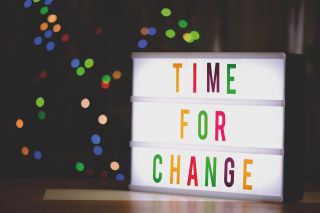Relationships
It Takes One to Tango: How to Change Others Singlehandedly
Here's what to do if your loved one stubbornly resists change.
Updated March 7, 2024 Reviewed by Ray Parker
Key points
- Believing we can't change other people is faulty thinking.
- We must begin by changing our actions first.
- Changing one element in a system can cause a chain reaction.

Have you ever heard the saying, "You can't change other people?" Everyone has.
In fact, think about the commonly used expressions reminding us that trying to change others is futile—"A leopard doesn't change his spots," "You can't get blood from a turnip (or a stone)," "Stop beating a dead horse," or "You can't teach an old dog new tricks."
I think you get the point. These idioms are shorthand for, "You might as well face it; your spouse/relative/friend/coworker's behavior is permanent, encoded in their DNA or personality (disorder), and nothing you do will make a difference.
But I'm here to tell you that this universally accepted conventional wisdom simply isn't true. You can change other people, but you must first change your own actions.
Many years ago, when I was a rookie therapist doing family therapy, Fran and her 14-year-old son, Brian, came to see me. Fran was concerned that Brian wasn't duly respectful of his grandmother, often arguing with her about homework and the chores he avoided doing around home.
This was especially troubling to Fran because she and Brian were temporarily living with the grandmother due to Fran's recent divorce and her dwindling finances. Fran worried that Brian's behavior would upset her mother.
Additionally, Fran admitted that she didn't like that her mother was "butting in." She wanted to handle her son without her mother's input.
I suggested inviting the grandmother to our next session so that Fran and her mother could talk things out. Fran looked horrified. She said there was no way she would even tell her mother she was seeking help, let alone invite her mother to a session. She said her mother, "Is old school. She doesn't believe in therapy. Plus, I would never want her to think I complained about her behind her back."
Because I thought my recommendation was important, I tried once again to get Fran to agree, but she would have none of it. Case closed.
So, I resigned myself to doing the best I could with what I had—Fran and Brian—and doing "second-rate" therapy. I offered Fran a few new parenting suggestions to help her become more effective in handling Brian.
Two weeks later, they returned. I began the session by asking her if she thought about my request to invite her mother to our session. She said, "There is absolutely no need to do that. My mother didn't intervene a single time in these past two weeks."
Surprised, I thought to myself, "Wait a minute. I didn't call or write the grandmother, suggesting that she back off. What in the world happened, I wondered?" It was simple.
It Takes One to Tango*
Fran stepped up to the plate and started parenting with confidence. Brian complied without complaining. Grandmother no longer felt the need to intervene. Period.
When one person changes, the system changes. In reality, this is a very simple notion but one with profound implications for relationship change. I realized on the spot that I didn't need every person in a family or relationship to be present in my office to do family or couples therapy because each person is a window into the system. If I can motivate even one person to change the way they approach a situation, relationship change is probable and inevitable.
Picture a mobile at rest. Then, imagine you begin to spin one of the mobile components. What happens? Eventually, the entire mobile begins to move. And so, too, with your relationships.
Need more proof?
Think about a loved one. Or imagine yourself spending a good evening with that person. You're having a great conversation; good feelings abound, and the love is flowing. Then, for some very strange reason, you decide you want the evening to go downhill.
Could you think of something you could say or do that would ruin the evening right on the spot? Of course, you can.
In my marriage, I know I can ruin an otherwise great day if I comment on my husband's driving—"You're going too fast," "That's not the best way to go." The day is over for us at that point. He gets so angry. It's predictable. It works every time.
That's why most people say, "I know how to push his buttons." See, if we know how to push our loved ones' buttons in negative ways, we can learn how to push their buttons in positive ways. Everyone has within him or her positive change buttons. We just have to know how to find them and then how to activate them.
A friend once told me that she hated how easily her husband got angry. Even if his anger wasn't geared toward her, she detested his emotional outbursts. As a result, she always did whatever she could to calm him down during those moments, which only made matters worse.
One day, she decided to do something different the next time he got angry. He was working in their den and started to scream with frustration, "I wasn't at the training. I can't believe my boss expects me to do this project. How would I know what to do if I wasn't at the training?"
Tempted to reassure him, she decided to try something new. She marched into the den, slammed her fist on the desk, and yelled, "Your boss is a complete jerk. You weren't at the training, and it's completely unrealistic of him to think you can do this. And now, our weekend is ruined."
Complete silence.
After several moments, her husband said in hushed tones, "Settle down, I'll figure it out."
Old dogs can, indeed, learn new tricks.
References
* 'It Takes One to Tango" has been registered with a national trademark office by Michele Weiner-Davis.




